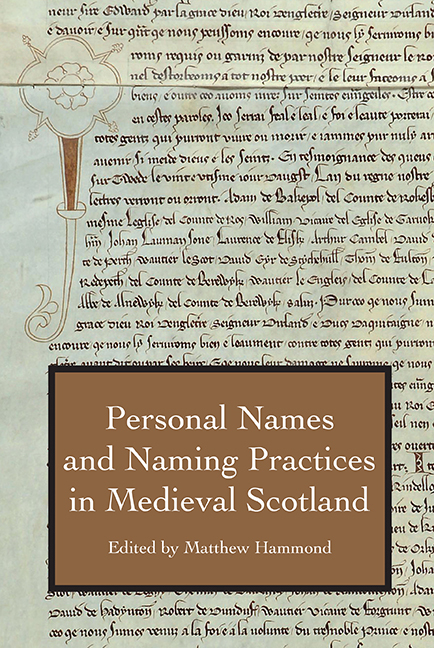Book contents
- Frontmatter
- Dedication
- Contents
- List of Tables
- Acknowledgements
- List of Contributors
- Abbreviations
- Note on the Text
- 1 Introduction: The Study of Personal Names in Medieval Scotland
- 2 Personal Names in Early Medieval Gaelic Chronicles
- 3 Gaelic Personal Names and Name Elements in Scottish Charters, 1093–1286
- 4 The Development of Mac Surnames in the Gaelic World
- 5 Forflissa/Forbflaith/Hvarflöð
- 6 Masculine Given Names of Germanic Origin in the Ragman Roll (1296)
- 7 The Romance of Names: Literary Personal Names in Twelfth- and Thirteenth-Century Scotland
- 8 Old Testament Personal Names in Scotland Before The Wars of Independence
- 9 Duthac Wigmore and Ninian Wallace: Scottish Saints and Personal Names in the later Middle Ages
- 10 Saints in Names in Late Medieval Argyll: a Preliminary Enquiry
- Bibliography
- Index
- Studies in Celtic History
8 - Old Testament Personal Names in Scotland Before The Wars of Independence
Published online by Cambridge University Press: 18 September 2019
- Frontmatter
- Dedication
- Contents
- List of Tables
- Acknowledgements
- List of Contributors
- Abbreviations
- Note on the Text
- 1 Introduction: The Study of Personal Names in Medieval Scotland
- 2 Personal Names in Early Medieval Gaelic Chronicles
- 3 Gaelic Personal Names and Name Elements in Scottish Charters, 1093–1286
- 4 The Development of Mac Surnames in the Gaelic World
- 5 Forflissa/Forbflaith/Hvarflöð
- 6 Masculine Given Names of Germanic Origin in the Ragman Roll (1296)
- 7 The Romance of Names: Literary Personal Names in Twelfth- and Thirteenth-Century Scotland
- 8 Old Testament Personal Names in Scotland Before The Wars of Independence
- 9 Duthac Wigmore and Ninian Wallace: Scottish Saints and Personal Names in the later Middle Ages
- 10 Saints in Names in Late Medieval Argyll: a Preliminary Enquiry
- Bibliography
- Index
- Studies in Celtic History
Summary
A study of the people of Scotland in the era before the death of Malcolm III, were such a task to be carried out for any statistical end, would be more or less meaningless on account of the incomplete, scrappy, and patchy nature of the evidence. Kathleen Hughes indeed had good reason to ask, ‘Where are the writings of early Scotland?’ A comparison of the sparse numerical data about the people of Scotland in the Christian centuries leading up to the watershed of 1093 against the substantial resources of information available after that date – when the continuous evidence of charters commences – presents a basic problem of method. Almost all the historical people of the earlier period can be gleaned from the various texts edited or collected by Alan Orr Anderson; and nearly all of these people are to be found gathered into the first part of his two-volume collection, Early Sources of Scottish History A.D. 500 to 1286. We know, then, of a few hundred historical people in the six centuries leading up to 1093; yet in the 193 years down to 1286 the evidence of charters alone yields over 15,000 named persons; and a large proportion of that number can be categorized according to their relationships, occupations, properties, and life-span.
Such questions of numerical data are relevant to my present purpose because in Scotland before the twelfth century the number of persons to be found with Old Testament names can be counted on the fingers of one hand, and three of those are associated with the episcopal and monastic church of Kingarth on the Isle of Bute. By the middle of the twelfth century, however, there has apparently been an explosion of personal names of Hebrew origin. We must suspect that this phenomenon is in part a result of the dramatic increase of written records around the same time. Nevertheless, the prosopographical database of the People of Medieval Scotland, 1093–1286 shows about 1350 persons spanning a potential range of thirty-six Hebraic names, so that about 9% of the strictly historical people of Scotland in the period 1093 to 1286 bore a name either taken from the Old Testament or which was of Hebrew origin.
- Type
- Chapter
- Information
- Publisher: Boydell & BrewerPrint publication year: 2019



